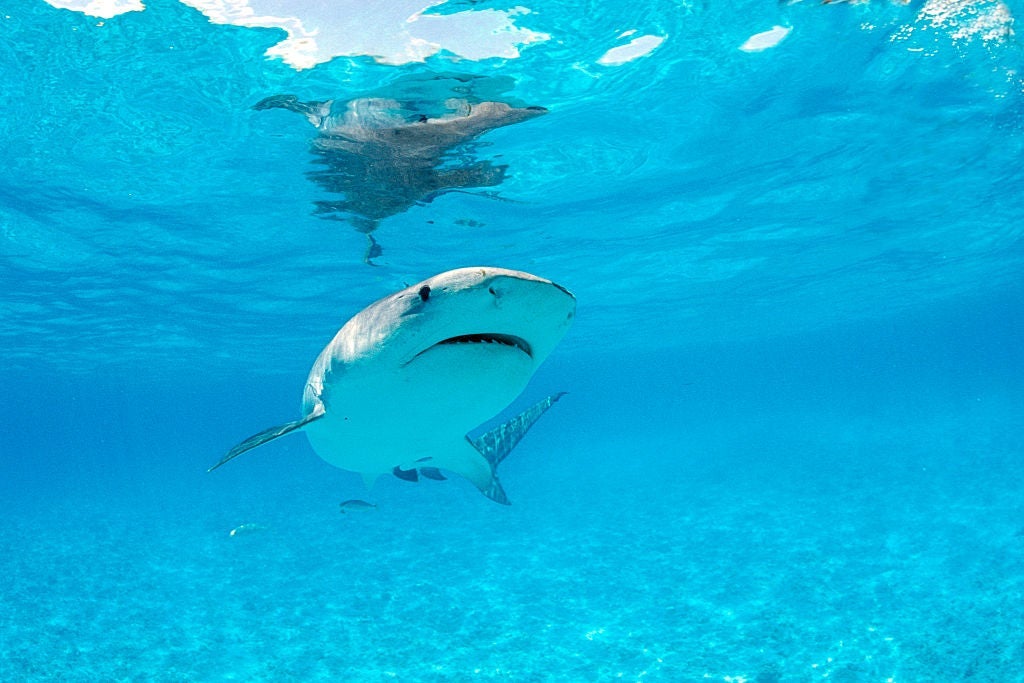Kauai's Hanalei Bay Closes, Reopens After Tiger Shark Attack
Hanalei Bay on the Hawaiian island of Kauai was closed to swimmers for 24 hours following an alleged tiger shark attack Monday.
According to the Kauai Fire Department, an unnamed off-duty firefighter was surfing in an area of the Hanalei Bay called "the bowl" when he was bitten by a tiger shark estimated to be about 13 feet long. The man sustained multiple deep lacerations to his leg and was transported to the hospital where he is recovering, according to the fire department.
"When we were going over there, there was like blood in the water and I was like 'Oh, God,'" said Chas Weimar, a local witness who helped rescue the victim. "He was weirdly calm about this. We were more freaked out about it than him." Weimar and Kea Dwight helped pull the victim into the boat and got him to help on shore. "He put the tourniquet on himself, and he was breathing and stuff," Dwight said.
Following the attack, lifeguards posted "Shark Sighted" and "No Swimming" signs along Hanalei Bay and notified Hawaii's Department of Land and Natural Resources of the incident, following standard protocol. The bay was reopened Tuesday afternoon after authorities reassessed the conditions and deemed the water safe, although beachgoers should be extra-cautious since sharks are more prevalent in the area at this time of year.
While the idea of a shark attack is terrifying, the average swimmer's chance of falling victim is extremely low. On average, only 80 unprovoked shark attacks occur worldwide each year, a staggeringly low statistic compared to the millions of people who enter the water. As a point of comparison, you are more likely to die in a plane crash (1 in 11 million) than you are to be attacked by a shark (1 in 11.5 million), and even less likely to die in a shark attack (less than 1 in 264.1 million).
In order to further decrease your chances of a shark attack, the Florida Museum of Natural History suggests swimmers take the following precautions:

- Avoid swimming during twilight or hours of darkness, as this is feeding time for sharks.
- Swim in groups whenever possible, as sharks are more likely to attack lone individuals, mistaking them for prey.
- Similarly, don't wander too far from shore.
- Do not enter the water if you're bleeding from an open wound or during menstruation, since sharks are highly sensitive to the smell of blood.
- Avoid shiny jewelry or other metallic reflective accents, since they can look like fish scales — a sign of prey for sharks.
- Avoid excessive splashing, since this attracts shark attention and mimics vulnerable behavior of injured prey.
- Do not harass sharks or enter the water when they are clearly present.
If you do find yourself approached by a shark, a proactive response is ideal, as sharks respect size and power, according to the Florida Museum. Hitting the shark on the nose, ideally with an inanimate object, is a deterrent action that usually results in the shark temporarily pausing its attack. Try to get out of the water as quickly as possible; if this isn't possible, repeated blows to the snout may be effective, although the result becomes increasingly less so with time. If the shark actually bites you, try clawing at its eyes and gills, which are sensitive areas for sharks.
In worst-case scenarios, certain credit cards such as the Chase Sapphire Reserve offer emergency medical coverage and evacuation insurance. If you know for certain that you will be in potentially dangerous waters, it might make sense to purchase an independent travel insurance plan.
TPG featured card
at Capital One's secure site
Terms & restrictions apply. See rates & fees.
| 5X miles | Earn 5X miles on hotels, vacation rentals and rental cars booked through Capital One Travel |
| 2X miles | Earn unlimited 2X miles on every purchase, every day |
Pros
- Stellar welcome offer of 75,000 miles after spending $4,000 on purchases in the first three months from account opening. Plus, a $250 Capital One Travel credit to use in your first cardholder year upon account opening.
- You'll earn 2 miles per dollar on every purchase, which means you won't have to worry about memorizing bonus categories
- Rewards are versatile and can be redeemed for a statement credit or transferred to Capital One’s transfer partners
Cons
- Highest bonus-earning categories only on travel booked via Capital One Travel
- LIMITED-TIME OFFER: Enjoy $250 to use on Capital One Travel in your first cardholder year, plus earn 75,000 bonus miles once you spend $4,000 on purchases within the first 3 months from account opening - that’s equal to $1,000 in travel
- Earn unlimited 2X miles on every purchase, every day
- Earn 5X miles on hotels, vacation rentals and rental cars booked through Capital One Travel
- Miles won't expire for the life of the account and there's no limit to how many you can earn
- Receive up to a $120 credit for Global Entry or TSA PreCheck®
- Use your miles to get reimbursed for any travel purchase—or redeem by booking a trip through Capital One Travel
- Enjoy a $50 experience credit and other premium benefits with every hotel and vacation rental booked from the Lifestyle Collection
- Transfer your miles to your choice of 15+ travel loyalty programs
- Top rated mobile app


